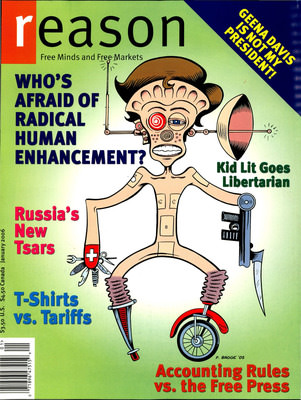Will Gene-Editing Technologies Spark the Next Cold War? They Already Have.
The folks behind CRISPR gene editing were runners-up for Time's Person of the Year. Their creation may win the future for secular China.

Sure, Donald Trump won Time's coveted Person of the Year award (coveted in the sense of, Who wouldn't want to be in a line of succession that includes Hitler, Stalin, and "You"?). But the runners-up, transhumanist visionary Zoltan Istvan reminds us, were the pioneers of the cheap and easy gene-editing techniques called CRISPR.
CRISPR, which stands for "clustered regularly interspaced short palindromic repeats," was discovered in 2012 and has really gained steam (sorry to be 19th-century in my metaphors) over the past couple of years. As Reason's Ronald Bailey has written, the low cost and ease of the technology has sparked all sorts of Brave New World-style fears but, more important, it offers immense hopes "to cure disease, correct defective genes, [and] create more productive crops." (Reason's archive on the topic is here.)
Writing at Motherboard, Istvan worries that anti-CRISPR attitudes in the United States—emanating from both religious rightists and technophobic leftists—could mean that America will largely be left behind by countries that have fewer hangups.
If China or another country vows to increase its children's intelligence via genetic editing (which I estimate they will be able to do in 5-10 years time), and America chooses to remain "au naturel" because they insist that's how God made them, a conflict species-deep will quickly arise. If this scenario seems too bizarre to happen, just consider the Russian Olympic track and field team that was banned in the recent 2016 Games for supposed doping.
It's quite possible the same accusatory flavor of "banning" could happen between China and America in the game of life—between its workers, its politicians, is people, its artists, and its media. I wonder if America—approximately 70 percent who identify as Christians—will put up with beings who modified themselves by science to be smarter and more functional entities.
This type of idea takes racism and immigration to a whole new level.
Istvan lays out three possible scenarios (transhumanists, bless their non-souls, love scenario planning and so should we all). First, a strongly religious Congress, bolstered by a president who wants to keep peace with a large part of his constituency, goes along with a ban on CRISPR tech that sees America falling behind other nations, especially those with authoritarian regimes that force things on their citizens whether they like it or not). Second, a total "transhumanist nightmare" in which a global ban is enacted against all forms of enhancement, out of some mix of technophobia, reactionaryism, and misguided egalitarianism. And third:
America could focus more on technology and less on biology and genetics. On my recent 4-month long Immortality Bus tour across America, I found conservative people seem more inclined to use tech accessories or wear a special headset that would make them smarter (for example, by connecting their thoughts Matrix-style into the cloud and AI)—as opposed to structurally changing their brains, as the Chinese likely will do. America could innovate that accessory tech that would keep us ahead of the biological modifications of other nations.
As an advocate of self-directed evolution and decentralized experiments in living (including experiments with the living, as long as consent is present), here's hoping that the American and global public recognizes the promises of CRISPR not necessarily to "perfect" the human race (whatever than might mean) but to better our condition by warding off disease and aging and by making it easier for all of us to imagine and reach our potential. And then to start over again when we figure out that what we really want to do is something totally different.
Must-watch: "The $140 Mail-Order CRISPR Kit: Is unregulated bio-hacking the future of science?"


Show Comments (61)